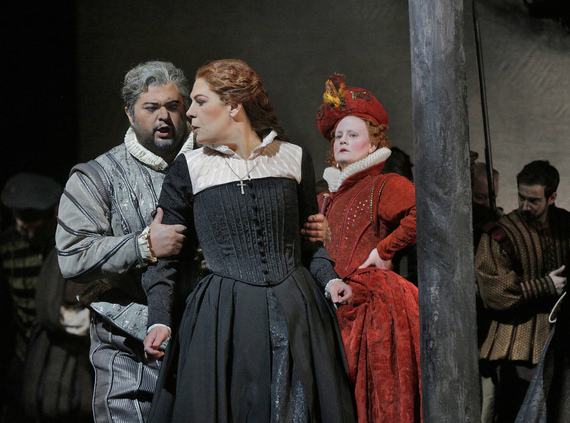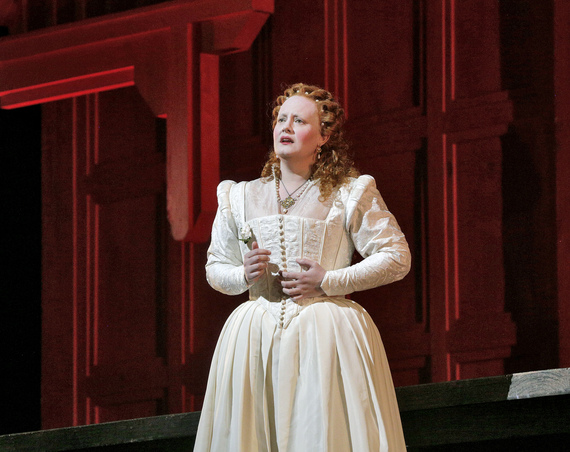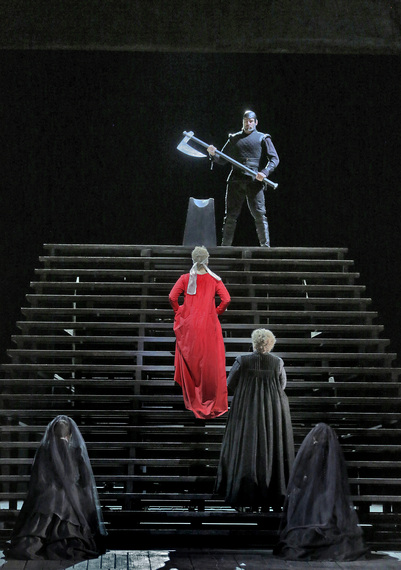The triptych of Gaetano Donizetti's Tudor Queens is a famously challenging cycle for any diva. Most notably sung by Beverly Sills at New York City Opera, the three queens at the centerpieces of Donizetti's Anna Bolena (Anne Boleyn), Maria Stuarda (Queen Elizabeth OR Mary Stuart, depending on what angle you come from), and Roberto Devereux (Elizabeth, again) are notorious for their vocal and dramatic demands. Earlier in the season, Sondra Randvanovsky tackled Anna Bolena, a role as notable for its length as its need for a wide tessitura and rolodex of vocal techniques. While opinions of Radvanovsky's performance were mixed, I found that the plusses (dramatic conviction, stellar high notes, thrilling vocal climaxes like only she can do these days, and a no-holds-barred vocal approach to the role) far outweighed the minuses (a lack of thrust in her lower register and some weakness in her agility singing). On Friday, Radvanovsky made another step towards completing the cycle as Maria Stuarda, the deposed Scottish queen at odds with her cousin Queen Elizabeth. Stuarda is somewhat of a different beast than Bolena (Stuarda lacks the need for a lower extension that Bolena has and is a seemingly shorter sing, though Stuarda also requires moments of virtuosity independent from the more consistently-taught drama in Bolena), but Radvanovsky latched onto the part with her brand of secure singing and triumphed once again.
The opera comes from the Friedrich Schiller play of the same name. While Schiller's adaptation draws from history, the centerpiece of the play-cum-opera is a heated confrontation between the two monarchs that actually never happened in history. The result, though, is a thrilling musical and dramatic moment that enlivens an opera that is often frustratingly formulaic and indecisive in scope. This is somewhat alleviated by David McVicar's minimalistic, stylish production (which he also oversaw this revival of). McVicar hones in on each character beyond the characterizations of Giuseppe Bardari's libretto, and what emerges is a clear depiction of two strong women: Mary, who is confident in her Catholic convictions and direct in her interactions with others, and Elizabeth, who has been crippled by her inability to form connections with her subjects and lurches about the stage like she has a nasty chafe. The opera itself looks sympathetically at Maria, but McVicar reminds the viewer that these women are flawed, and it's OK not not warm to either of them.
In the title role, Radvanovsky was pushed to incorporate all of her vocal tricks into a shorter evening of singing. Pianissimi were often and well spun, high notes (the optional high note Radvanovsky took when Maria brands Elisabetta an "obscene and unworthy whore" was particularly thrilling) rang out, and, with the exception of a lacking trill at the end of "O Nube" and some lagging in agility as she negotiated the ensemble following the Confrontation, the vocal climaxes she built to were electrifying. The show revolved around Radvanovsky and her warm stage presence made her final climb up the executioner's scaffold an unexpectedly poignant moment, despite the churning, relentless orchestral accompaniment playing the theme from Maria's cabaletta, "Nella Pace del Mesto Riposo," that was lead with balance and style by Maestro Riccardo Frizza.
Elza van Den Heever returned to the role of Elisabetta after singing the part opposite Joyce DiDonato's poetic Maria when the production premiered in 2013 (And if, like me, most of your experience with the opera comes from hearing DiDonato, a mezzo, do the part, then hearing the same music sung by a soprano is a very different experience.). Her voice may be more grainy that beautiful, but it has dramatic heft and she sang with security throughout the evening. And though the sound can be grating after a while and the voice just cannot muster up the charisma to meet Radvanovsky in the numerous vocal climaxes that make this opera satisfying, the two Queen's voices blended perfectly. Neither sound is particularly beautiful, but they voices complemented each other in that there were moments where they sounded similar. The conflict at the heart of Maria Stuarda is that Maria and Elisabetta are cousins and there is a huge discrepancy in power between them. All of a sudden, the members of this family were singing the same tune.
This opera is all about the ladies, and the men in it need no more than to be good ensemble singers or duet partners, which they all were. Celso Albelo, in his Met debut as Leicester, possesses a sweet and idiomatic voice, but no singer is served well next to two powerhouse divas hurling insults at each other. Patrick Carfizzi was in good voice, his rich bass-baritone amply filling William Cecil's lines. Kwangchul Youn as Talbot brought sensitive singing to the Confession duet with Maria, accompanying her with diligence and fluidity. In the small role of Anna Kennedy, one of Maria's servants, Maria Zifchak exuded her usual warm stage presence but wielded an increasingly thinning voice.
The Met Orchestra and Chorus were in their usual top form. The "Preghiera" in the third act, where Radvanovsky's voice rose above the chorus and bloomed into the house, was one of the most cohesive and moving moments of music-making I have witnessed at the Met. Jennifer Tipton's lighting is evocative, spanning from the levity of the initial festivities at Whitehall to the grim scaffold that Maria ultimately mounts. John Macfarlane's consumes are dark and nondescript, but his sets do everything to complement Donizetti's sometimes-evocative music and set the mood (which is, usually, super gloomy).
Heads roll at the Met through February 20th, and Radvanovsky dons the ruff in Roberto Devereux starting on March 24th. With the precedent set by her performances in the previous two operas, it should be a jolly good time.
Photos by Ken Howard


